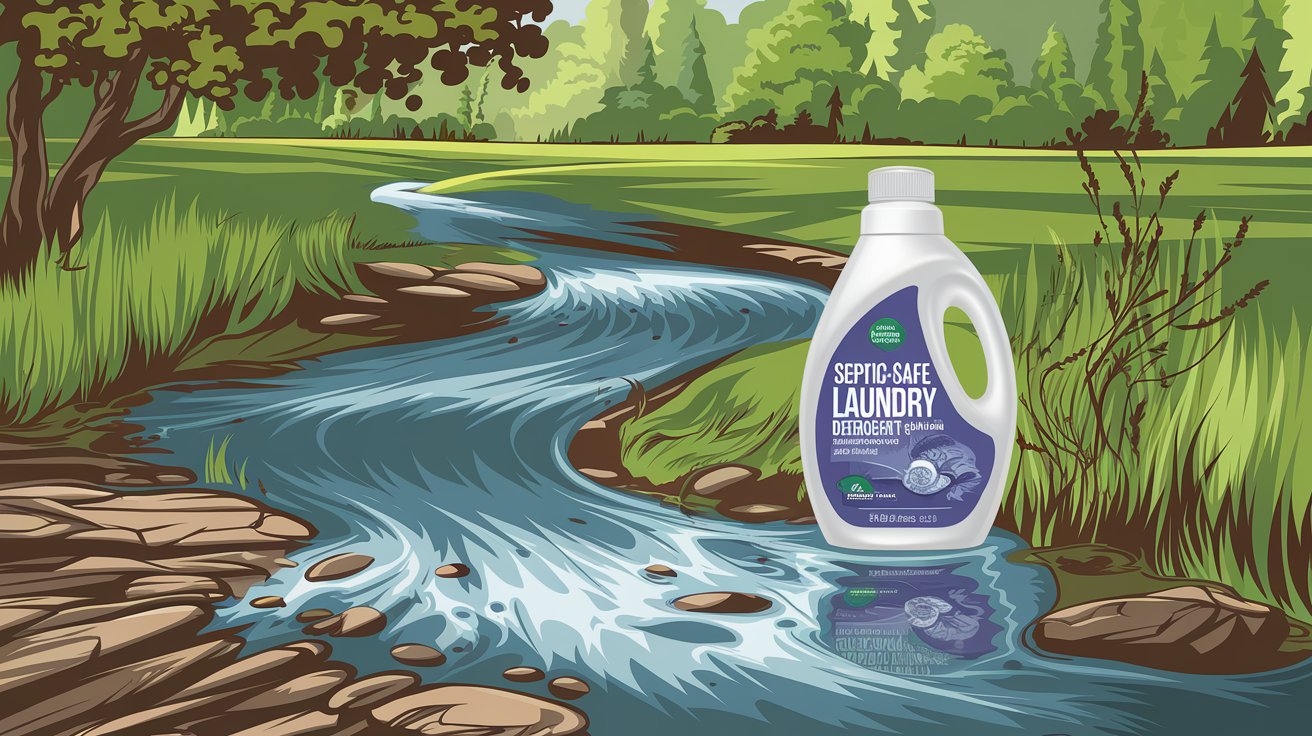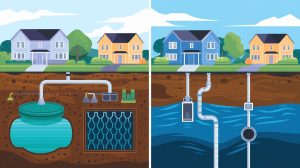Choosing the right laundry detergents for septic systems is essential for maintaining the health and efficiency of your septic tank. Septic systems depend on beneficial bacteria to break down waste, and using unsuitable detergents can disrupt this balance. This can lead to clogs, unpleasant odors, and expensive repairs.
In this guide, we’ll discuss the best laundry detergents for septic systems, their benefits, and how to use them effectively. Whether you’re new to septic-safe products or looking to improve your routine, this article will help you make informed decisions.
Table of Contents
- Understanding Septic Systems and Laundry Detergents
- What Makes a Laundry Detergent Septic-Safe?
- Top Laundry Detergents for Septic Systems
- How to Choose the Right Detergent for Your Needs
- Tips for Using Laundry Detergents with Septic Systems
- Top FAQs About Laundry Detergents and Septic Systems: What You Need to Know
- Septifix
- Septic Permit Links by State
Understanding Septic Systems and Laundry Detergents
Septic systems are vital for managing household wastewater, relying on natural bacteria to break down waste efficiently. However, not all laundry detergents are compatible with septic systems. Choosing the wrong detergent can disrupt this delicate process, leading to costly issues.
How Laundry Detergents Impact Septic Systems
Conventional detergents often contain harsh chemicals, phosphates, or excessive sudsing agents that harm septic systems. These detergents can:
- Kill the beneficial bacteria essential for waste breakdown.
- Cause sludge buildup, leading to clogs and system backups.
- Contribute to environmental pollution through harmful wastewater discharge.
Why Septic-Safe Laundry Detergents Matter
Septic-safe laundry detergents are specifically designed to protect your septic system while keeping your clothes clean. They are formulated with biodegradable ingredients, free of harmful chemicals, and low in suds, ensuring the system’s bacterial balance remains intact. Benefits include:
- Preventing damage to the septic tank and drain field.
- Minimizing the risk of expensive repairs or system failures.
- Supporting eco-friendly wastewater management.
By understanding the importance of laundry detergents for septic systems, you can protect your home’s plumbing and contribute to a healthier environment.
What Makes a Laundry Detergent Septic-Safe?
Not all detergents are created equal, and when it comes to protecting your septic system, choosing the right one is essential. Septic-safe laundry detergents are formulated with specific features that ensure they clean effectively without harming your system or the environment.
Key Features of Septic-Safe Detergents
- Biodegradable Ingredients
- These detergents break down naturally, reducing the risk of chemical buildup in the tank and drain field.
- Low-Sudsing Formulas
- Excessive suds can interfere with the septic system’s natural processes, leading to inefficiency.
- Free of Phosphates and Harsh Chemicals
- Phosphates can disrupt bacterial balance and harm the environment. Look for detergents labeled phosphate-free.
- Avoidance of Antibacterial Agents and Bleach
- These chemicals kill the beneficial bacteria essential for breaking down waste.
How to Identify Septic-Safe Laundry Detergents
- Look for labels indicating “septic-safe” or “suitable for septic systems.”
- Check the ingredient list for eco-friendly components and the absence of phosphates or harsh chemicals.
- Choose detergents certified by environmental organizations or those with biodegradable claims.
By selecting detergents with these features, you can ensure your septic system operates efficiently and lasts longer. Additionally, using septic-safe products contributes to sustainable living and environmental protection.
Top Laundry Detergents for Septic Systems
Choosing the best laundry detergents for septic systems can be overwhelming, given the variety of options available. Here’s a list of top-rated septic-safe detergents that balance effective cleaning with system protection.
1. Seventh Generation Free & Clear
Why It’s Septic-Safe: This detergent is free of dyes, fragrances, and phosphates, making it gentle on your septic system.
- Additional Benefits: Plant-based and biodegradable, it’s also safe for sensitive skin and environmentally friendly.
2. Tide Purclean
Why It’s Septic-Safe: Made with 75% plant-based ingredients and free of harsh chemicals, it supports septic system health.
- Additional Benefits: Effective in both high-efficiency (HE) and standard washing machines.
3. Arm & Hammer Plus OxiClean
Why It’s Septic-Safe: This low-sudsing formula is safe for septic systems and tough on stains.
- Additional Benefits: Contains baking soda for a natural boost in odor elimination.
4. Method Laundry Detergent
- Why It’s Septic-Safe: Made with biodegradable ingredients and no phosphates, it’s a reliable choice for septic systems.
- Additional Benefits: Concentrated formula means fewer chemicals per load.
5. Mrs. Meyer’s Clean Day
- Why It’s Septic-Safe: Free of chlorine bleach and made with plant-derived ingredients, it’s gentle on septic tanks.
- Additional Benefits: Available in a variety of natural fragrances.
How to Choose the Right Detergent for Your Needs
Consider skin sensitivities when selecting a detergent.
- Ensure compatibility with your washing machine type (HE or standard).
- Look for eco-friendly certifications to confirm biodegradability and septic safety.
By selecting one of these top-performing laundry detergents for septic systems, you can enjoy clean clothes while ensuring your septic system remains efficient and problem-free.
Tips for Using Laundry Detergents with Septic Systems
Even when using the best laundry detergents for septic systems, how you do your laundry can significantly impact the health of your septic system. Follow these tips to maximize efficiency and minimize potential issues.
1. Avoid Overloading Your Washing Machine
- Running too many loads in a short period can overwhelm your septic system.
- Space out laundry sessions to allow the system to process water effectively.
2. Use the Recommended Detergent Amount
- More detergent doesn’t mean cleaner clothes. Excess detergent can create buildup in your septic tank.
- Always follow the manufacturer’s instructions for the correct dosage.
3. Opt for Liquid Detergents Over Powders
- Powder detergents can sometimes clump and lead to residue in pipes and tanks.
- Liquid detergents dissolve more easily, reducing the risk of buildup.
4. Combine Laundry Loads When Possible
- Washing small loads frequently can strain your septic system.
- Combine similar items to reduce the number of cycles without overloading the machine.
5. Avoid Fabric Softeners and Dryer Sheets
- Many fabric softeners contain chemicals that can disrupt the bacteria in your septic system.
- Opt for natural alternatives like wool dryer balls or vinegar.
6. Perform Regular Maintenance on Your Septic System
- Use septic-safe cleaning products to maintain the balance of bacteria in your tank.
- Schedule periodic inspections and pumping to ensure your system operates efficiently.
Conclusion: Protecting Your Septic System with the Right Laundry Detergents
Maintaining a healthy septic system requires more than just regular pumping—it’s about making smart choices in the products you use. Laundry detergents for septic systems play a vital role in keeping your septic tank functioning efficiently. By choosing septic-safe detergents, you ensure that the delicate balance of bacteria in your system is preserved, preventing costly repairs and environmental damage.
Remember to opt for biodegradable, phosphate-free, and low-sudsing detergents. Additionally, follow best practices such as not overloading your washing machine and using the recommended detergent amount. With these simple steps, you can protect both your septic system and the environment.
Top FAQs About Laundry Detergents and Septic Systems: What You Need to Know
What types of laundry detergents are safe for septic systems?
Liquid detergents are generally recommended for septic systems because they break down more easily and don’t contain the clay fillers found in some powdered detergents, which can contribute to sludge buildup. Oregon State University Extension
Are powdered detergents harmful to septic systems?
Yes, powdered detergents can be problematic for septic systems. They may contain fillers that don’t dissolve completely, leading to clogs in pipes and the drain field. Justice Plumbing
Can I use laundry detergent pods with a septic system?
Yes, single-dose detergent pods without harmful fillers are generally safe for septic systems.
How do surfactants in detergents affect septic systems?
Surfactants help break down dirt and grease but can disrupt the bacterial balance in septic tanks if used excessively. Opting for natural or oleochemical surfactants made from plant oils is a safer alternative, as they generate fewer suds and are less likely to disrupt your septic system. Martin Septic
Is there an official certification for septic-safe laundry detergents?
No, there is no official designation for septic-safe laundry detergents. However, many eco-friendly, biodegradable detergents are considered safe for septic systems. Oregon State University Extension
How can I prevent laundry from overloading my septic system?
Avoid doing multiple loads of laundry in a single day, as this can overwhelm the system. Spacing out laundry loads allows the septic system to process wastewater more effectively.
Are there specific laundry practices to follow for septic system health?
Yes, in addition to using septic-safe detergents, it’s advisable to install a lint filter in the washer’s drainage line to prevent blockages and consider using plant-based, environmentally friendly laundry products.
Septifix









